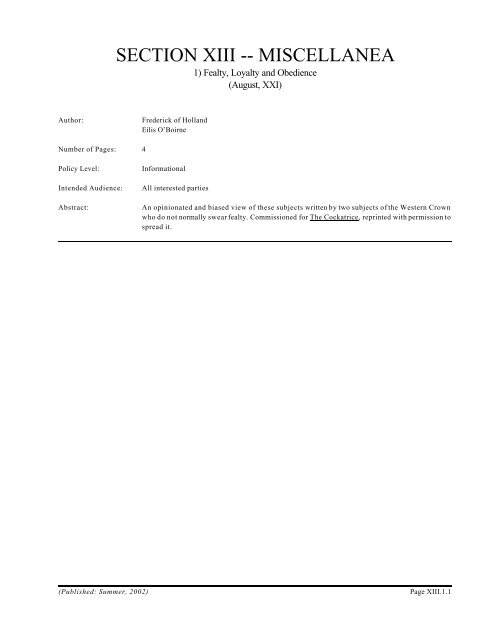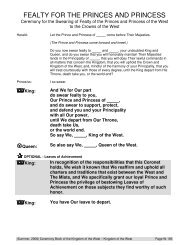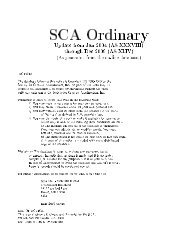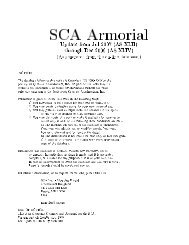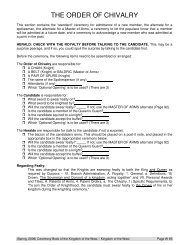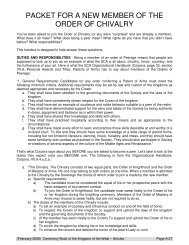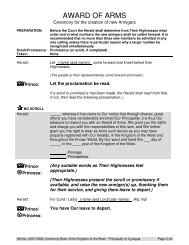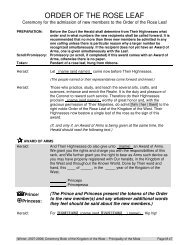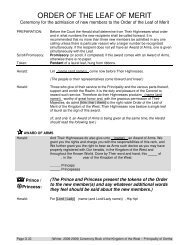Fealty, Loyalty and Obedience - West Kingdom College of Heralds ...
Fealty, Loyalty and Obedience - West Kingdom College of Heralds ...
Fealty, Loyalty and Obedience - West Kingdom College of Heralds ...
You also want an ePaper? Increase the reach of your titles
YUMPU automatically turns print PDFs into web optimized ePapers that Google loves.
SECTION XIII -- MISCELLANEA<br />
1) <strong>Fealty</strong>, <strong>Loyalty</strong> <strong>and</strong> <strong>Obedience</strong><br />
(August, XXI)<br />
Author:<br />
Frederick <strong>of</strong> Holl<strong>and</strong><br />
Eilis O’Boirne<br />
Number <strong>of</strong> Pages: 4<br />
Policy Level:<br />
Intended Audience:<br />
Abstract:<br />
Informational<br />
All interested parties<br />
An opinionated <strong>and</strong> biased view <strong>of</strong> these subjects written by two subjects <strong>of</strong> the <strong>West</strong>ern Crown<br />
who do not normally swear fealty. Commissioned for The Cockatrice, reprinted with permission to<br />
spread it.<br />
(Published: Summer, 2002)<br />
Page XIII.1.1
<strong>Fealty</strong>, <strong>Loyalty</strong> <strong>and</strong> <strong>Obedience</strong><br />
<strong>West</strong> <strong>Kingdom</strong> Herald’s H<strong>and</strong>book<br />
This Page Intentionally Left Blank<br />
Page XIII.1.2 (Published: Summer, 2002)
<strong>West</strong> <strong>Kingdom</strong> Herald’s H<strong>and</strong>book<br />
<strong>Fealty</strong>, <strong>Loyalty</strong> <strong>and</strong> <strong>Obedience</strong><br />
FEALTY, LOYALTY, AND OBEDIENCE<br />
(AS WE KNOW AND USE THEM)<br />
Frederick <strong>of</strong> Holl<strong>and</strong> & Eilis O’Boirne (August, XXI)<br />
We have written this article at the request <strong>of</strong> Lord Reynardine <strong>of</strong> Tara. It is a brief introduction to fealty, loyalty, <strong>and</strong><br />
obedience, as they are understood by the authors to be practiced in the <strong>West</strong> <strong>Kingdom</strong> <strong>of</strong> the Society for Creative<br />
Anachronism. We are Duke Frederick <strong>of</strong> Holl<strong>and</strong>, MSCA, OP, <strong>and</strong> Mistress Eilis O’Boirne, OP. Please be aware that the<br />
opinions given here are our own, <strong>and</strong> do not represent any <strong>of</strong>ficial policy <strong>of</strong> the <strong>Kingdom</strong> <strong>of</strong> the <strong>West</strong>, nor necessarily the<br />
opinions <strong>of</strong> a majority <strong>of</strong> the people in the <strong>Kingdom</strong>. Further, opinions on these subjects differ even more between<br />
<strong>Kingdom</strong>s than they do in any one <strong>Kingdom</strong>, so this paper should be read only as reflecting some <strong>of</strong> the attitudes held in<br />
the <strong>West</strong>. We would like to thank Sir William the Lucky <strong>and</strong> Mistress Hilary <strong>of</strong> Serendip for constructive criticism <strong>and</strong><br />
judicious editing.<br />
FEALTY<br />
In the Old Middle Ages, fealty was a contract between<br />
lord <strong>and</strong> vassal, based on concrete benefits for both<br />
parties, <strong>and</strong> with very specific terms <strong>and</strong> limitations. The<br />
vassal, say a knight or baron, would receive a fief, most<br />
<strong>of</strong>ten a piece <strong>of</strong> l<strong>and</strong>. In return, he would promise to fight<br />
for his overlord (bringing along a certain number <strong>of</strong> men<br />
<strong>and</strong> horses for a specified time period), or to perform some<br />
other service, or to pay an annual rent, either in coin or in<br />
produce. These contracts were <strong>of</strong>ten very specific,<br />
promising so much aid for a battle against Lord Thus-<strong>and</strong>-<br />
So, <strong>and</strong> less aid for a battle against Lord This-<strong>and</strong>-That,<br />
but more aid if Lord This-<strong>and</strong>-That was the one who<br />
provoked the quarrel.<br />
<strong>Fealty</strong> was a cornerstone <strong>of</strong> the feudal system, influencing<br />
both economic <strong>and</strong> social life, <strong>and</strong> it shaped the ideals <strong>of</strong><br />
the period. Oaths <strong>of</strong> fealty, <strong>and</strong> their consequences, were<br />
an important part <strong>of</strong> the history <strong>and</strong> literature from which<br />
we drew our inspiration in creating the Current Middle<br />
Ages. Therefore, fealty naturally occurred in our recreation.<br />
For us, however, it is an emotional rather than an<br />
economic force. We could not re-create it in its original<br />
form -- our Kings have very few manors to give to their<br />
supporters.<br />
The eventual result <strong>of</strong> twenty years <strong>of</strong> experience,<br />
evaluation, adaptation, <strong>and</strong> re-evaluation (mostly<br />
subconscious) is a system in which Peers <strong>and</strong> Great<br />
Officers swear fealty to the Crown, <strong>and</strong> the Crown returns<br />
the fealty. The oaths are lovely, <strong>and</strong> impressive, <strong>and</strong> fill a<br />
real emotional <strong>and</strong> ceremonial ne ed. However, the<br />
meaning <strong>of</strong> the oaths is meaningless at best. Some people<br />
feel that they are simply a collection <strong>of</strong> words which feel<br />
“proper” but which bind each side to nothing. Others feel<br />
that the oaths are much more serious, <strong>and</strong> that they do<br />
bind both sides to commitments <strong>of</strong> loyalty, obedience,<br />
<strong>and</strong> mutual service. When you speak <strong>of</strong> fealty in the<br />
Society, make sure that you <strong>and</strong> your audience are both<br />
t hinking <strong>of</strong> the same thing. If you do not, unnecessary<br />
misunderst<strong>and</strong>ings may develop.<br />
The foundation oath <strong>of</strong> our system is the one sworn by<br />
each Sovereign at his Coronation. In it, he swears to<br />
protect the <strong>Kingdom</strong>, <strong>and</strong> all who dwell in it, to the best <strong>of</strong><br />
his ability. This is the Society version <strong>of</strong> the mythos<br />
which binds a King to his l<strong>and</strong>. It is the fulfillment <strong>of</strong> this<br />
oath which differences the true King from the tyrant <strong>and</strong><br />
keeps the power <strong>of</strong> the Crown from being abused. Further,<br />
the King is bound to obey this oath by custom <strong>and</strong><br />
tradition, which are, in the <strong>West</strong>, far more binding than the<br />
limits set down either by the oath or in Law. The practical<br />
limit on the abuse <strong>of</strong> Royal Power is peer pressure, for in<br />
this <strong>Kingdom</strong> there is a large, active, <strong>and</strong> vocal group <strong>of</strong><br />
Peers, drawn from all the Peerage Orders, who have strong<br />
opinions <strong>and</strong> are not shy about expressing them. If these<br />
people feel that a King is choosing an unwise course,<br />
they will not hesitate to inform him <strong>of</strong> this fact -- although<br />
they will generally do so in private <strong>and</strong> avoid making a<br />
scene in Court. Whether the King chooses to take the<br />
advice <strong>of</strong>fered is his decision, but he should consider it<br />
carefully. If nothing else, he must consider whether he<br />
wants to live with the consequences after he leaves the<br />
Throne. (The final protection from a bad King is the fact<br />
that one can always choose to take a brief vacation from<br />
the Society -- until a new King is chosen.)<br />
It is the King’s Oath that makes it not only unnecessary<br />
but actually inappropriate for those members <strong>of</strong> the<br />
populace who are not Peers to swear fealty to the King. If<br />
they do so, the King promises protection (as he has<br />
already promised in the Crown oath), in return for a<br />
promise <strong>of</strong> personal loyalty <strong>and</strong> obedience. He gives<br />
nothing he has not already given, <strong>and</strong> takes back<br />
substantially more than he had before. <strong>Fealty</strong> is a mutual<br />
contract, <strong>and</strong> when something is given, something should<br />
(Published: Summer, 2002)<br />
Page XIII.1.3
<strong>Fealty</strong>, <strong>Loyalty</strong> <strong>and</strong> <strong>Obedience</strong><br />
be returned. It is, however, both fitting <strong>and</strong> proper for the<br />
populace to <strong>of</strong>fer homage -- a formal statement <strong>of</strong> their<br />
respect for the King <strong>and</strong> for the Crown. In a ceremony <strong>of</strong><br />
homage, the King is promised nothing, but is <strong>of</strong>fered<br />
honor by his people. He gives back nothing but his<br />
thanks. There are no lasting bonds formed; the ceremony<br />
simply acknowledges those which already exist.<br />
It is proper for the Peers to enter into fealty, as they have<br />
received a fief <strong>of</strong> sorts. They have been given titles, <strong>and</strong><br />
the right to wear certain badges <strong>of</strong> rank, <strong>and</strong> public<br />
recognition <strong>of</strong> their accomplishments. If they choose to<br />
swear fealty, they are given, in addition, the right to call<br />
upon the King, <strong>and</strong> upon the bond <strong>of</strong> fealty when they<br />
need to. In return, the King gets the knowledge that these<br />
Peers will support him, to the best <strong>of</strong> their notinconsiderable<br />
ability, whenever he needs to call on them.<br />
Since the words <strong>of</strong> the oath are vague, the limits to these<br />
bonds are set, again, by custom <strong>and</strong> tradition. As a<br />
general rule in the Society, the overlord should invoke<br />
fealty gently. The vassals should invoke it formally, <strong>and</strong><br />
only if truly necessary. It is proper for the King to remind<br />
his knights that they should fight in an upcoming War,<br />
but it would be improper for him to invoke their oaths <strong>and</strong><br />
insist that they attend even if it would create difficulties<br />
for them. It would be inappropriate for a knight to use his<br />
fealty to ask his King’s support in a private quarrel,<br />
unless his honor as a knight had been questioned, <strong>and</strong><br />
even then he should endeavor to solve the problem<br />
himself, <strong>and</strong> only call on his overlord in an extreme case.<br />
The only persons ever obliged to swear personal fealty<br />
(that is, fealty sworn in one’s own person, not as King or<br />
Prince) are those members <strong>of</strong> the Order <strong>of</strong> Chivalry who<br />
elected to be named Knights. Whether they are obliged to<br />
renew this oath at each Coronation is a subject <strong>of</strong> debate,<br />
with some claiming that, if it is possible, a knight should<br />
swear to each new King, <strong>and</strong> others maintaining that a<br />
knight is in fealty to the Crown <strong>and</strong> <strong>Kingdom</strong>, <strong>and</strong> does<br />
not need to renew his fealty to each individual King<br />
(although he should unless there is cause). There are<br />
arguments to support each <strong>of</strong> these points <strong>of</strong> view. There<br />
is no “<strong>of</strong>ficial” correct position in the <strong>West</strong>.<br />
For all other Peers, entering personal fealty is optional.<br />
This is also true for the Great Officers <strong>and</strong> ceremonial<br />
heads <strong>of</strong> territorial groups. The oath sworn by the Officers<br />
<strong>and</strong> territorial Barons is for fealty in their Offices, not<br />
personal fealty. In other words, while acting ex <strong>of</strong>ficio,<br />
they are bound by their Oaths, but they are not so bound<br />
while acting in a personal capacity. (They should be very<br />
careful to keep the two separate -- but that's another<br />
<strong>West</strong> <strong>Kingdom</strong> Herald’s H<strong>and</strong>book<br />
article.) In fact, those Officers who are not comfortable<br />
swearing personal fealty may state explicitly, in the oath,<br />
“In my Office, I so swear.”<br />
All the relationships discussed above are “public”<br />
fealties. Oaths <strong>of</strong> this kind may be accepted only by a<br />
King or Prince, or by a Viceroy, Baron, or other<br />
designated representative, in the name <strong>of</strong> the King or<br />
Prince. They should not be dem<strong>and</strong>ed by, or <strong>of</strong>fered to,<br />
Barons or other heads <strong>of</strong> branches as part <strong>of</strong> their <strong>of</strong>fice.<br />
In fact, such oaths have been specifically disallowed in<br />
the <strong>West</strong>.<br />
Of the “private” oaths <strong>of</strong> fealty, the most common is that<br />
sometimes sworn between a knight <strong>and</strong> a squire. In this<br />
oath, the knight will promise to instruct the squire in<br />
fighting <strong>and</strong> the ways <strong>of</strong> chivalry, usually in return for<br />
some degree <strong>of</strong> personal service on the part <strong>of</strong> the squire.<br />
The relationship must be clearly understood by both<br />
parties, <strong>and</strong> the conditions clearly set forth, as the terms<br />
are much less clearly defined by custom, <strong>and</strong> thus are<br />
more liable to abuse. In many knight-squire pairings, the<br />
bonds are indistinguishable from those <strong>of</strong> simple<br />
friendship <strong>and</strong> those developed by training together.<br />
However in others there may be a strong master-servant<br />
aspect (“Squire! More beer!”), which reflects some <strong>of</strong> the<br />
older medieval models. This might seem to run counter to<br />
the courtesy which we are all supposed to show in our<br />
dealings with each other. However, it is acceptable, even<br />
appropriate, in these relationships, provided that it has<br />
been agreed upon by both parties. It would not be an<br />
acceptable expression <strong>of</strong> the bond between the King <strong>and</strong><br />
one <strong>of</strong> his knights. Theirs is a more formal relationship, a<br />
contract between two who are essentially equals. It<br />
should be called upon only for higher purposes.<br />
Occasionally all the members <strong>of</strong> a household will enter<br />
into joint oaths <strong>of</strong> fealty, or will sear fealty to the head <strong>of</strong><br />
the household. This sort <strong>of</strong> bond is even more dangerous<br />
than that between a knight <strong>and</strong> his squire, as it is even<br />
less well defined by custom <strong>and</strong> tradition. Although it is<br />
not met with <strong>of</strong>ten, it is very open to abuse, especially<br />
since the members <strong>of</strong> a household usually interact a great<br />
deal <strong>of</strong> the time on an informal basis. <strong>Fealty</strong> in the SCA is<br />
more appropriate to a formal relationship, <strong>and</strong> is not truly<br />
needed within households. If the members <strong>of</strong> a household<br />
feel the need for mutual promises, it would be more<br />
a ppropriate for them to swear mutual support <strong>and</strong><br />
friendship, until such time as they part.<br />
Although all these oaths bind only within the Society, it<br />
is sometimes difficult to determine exactly where the<br />
Page XIII.1.4 (Published: Summer, 2002)
<strong>West</strong> <strong>Kingdom</strong> Herald’s H<strong>and</strong>book<br />
Society ends <strong>and</strong> mundane life begins. In general, the<br />
extension <strong>of</strong> an oath <strong>of</strong> fealty to mundane life, or to<br />
informal SCA situations like fighter practices, is entirely<br />
voluntary. However, if one takes the Society seriously,<br />
this extension (like the extension <strong>of</strong> courtesy <strong>and</strong> chivalry<br />
to all) comes naturally. The difficulty is that courtesy <strong>and</strong><br />
chivalry don't get you in trouble outside the Society, but<br />
attempting to maintain or enforce a bond <strong>of</strong> fealty may.<br />
A word which might be considered at this time is<br />
“glamour”. In its old sense, glamour meant magic, a spell<br />
or enchantment. In its modern sense, it means alluring<br />
charm. <strong>Fealty</strong> is a “glamorous” relationship in both senses<br />
<strong>of</strong> the word. It is a relationship filled with the possibility<br />
<strong>of</strong> danger, but with a great potential for adding a<br />
dimension to our lives which is missing in the mundane<br />
world. It should be entered into only after the<br />
consequences have been thought out, <strong>and</strong> should not be<br />
taken lightly.<br />
LOYALTY<br />
Even to those who are not all that serious about<br />
participation in the Society, loyalty to Crown <strong>and</strong><br />
<strong>Kingdom</strong> should never be an issue. It is one <strong>of</strong> the<br />
binding forces which holds us together. This loyalty can<br />
be exp ressed in various ways. It starts with simply<br />
d ressing for events, <strong>and</strong> acting in a manner which<br />
maintains the illusion for those around -- not necessarily<br />
fancy or formal, but in keeping with the surroundings.<br />
Beyond this minimum, which occupies very little time,<br />
some people feel that it is among their responsibilities to<br />
travel as much as they can to far parts <strong>of</strong> the <strong>Kingdom</strong>.<br />
There they do what they can to enhance the Society for<br />
those who do not live where they can attend an event<br />
every weekend <strong>and</strong> pursue SCA activities three evenings<br />
a week if they so choose. Others express their loyalty by<br />
putting in many hours a week, every week, event or not,<br />
on the semi-mundane tasks which are necessary to allow<br />
the Society to function. There are some who feel that they<br />
should attend all Crown events <strong>and</strong> Courts, to bear<br />
witness to the business <strong>of</strong> the <strong>Kingdom</strong>.<br />
Another common way <strong>of</strong> expressing loyalty is the vocal<br />
boasting <strong>and</strong> boosting <strong>of</strong> your Principality or Barony or<br />
Province. This sort <strong>of</strong> vocal loyalty gets its best<br />
expression in the declarations <strong>of</strong> War, <strong>and</strong> rhetoric can<br />
run high on both sides, <strong>and</strong> flow on for hours. But since,<br />
by a gentlemen’s agreement, all parties know that neither<br />
side will be converted, no one’s feelings should be hurt.<br />
These are all valid expressions <strong>of</strong> loyalty to the Crown,<br />
<strong>and</strong> each serves to enrich the lives <strong>of</strong> us all. However, it<br />
<strong>Fealty</strong>, <strong>Loyalty</strong> <strong>and</strong> <strong>Obedience</strong><br />
is worth noting that, by common consent, “patriotic<br />
fervor” is not emphasized at <strong>Kingdom</strong> level by subjects <strong>of</strong><br />
the <strong>West</strong>, especially when they are dealing with subjects<br />
<strong>of</strong> other <strong>Kingdom</strong>s . There are several reasons for this.<br />
One is that, since the SCA started in the Wes t, other<br />
<strong>Kingdom</strong>s perceive that there is a “<strong>West</strong>ern monolith”<br />
which is out to control the Society, <strong>and</strong> any boasting on<br />
our part would be taken badly. Another is the strong<br />
tradition in the <strong>West</strong> toward humility, which is sometimes<br />
actually a form <strong>of</strong> reverse snobbery. (“I'm just a simple<br />
country knight...”)<br />
It is possible to have loyalty to the <strong>Kingdom</strong>, a<br />
Principality, a local branch, a household, an <strong>of</strong>fice -- all at<br />
the same time. It is possible for some <strong>of</strong> these loyalties to<br />
come into conflict, <strong>and</strong> that is when we have to decide<br />
which ties are most binding. This problem is not new -- it<br />
was a common one in the Old Middle Ages. The decision<br />
as to which loyalty should be given priority at a given<br />
time can be different in different cases. But if the conflict<br />
is between two ties <strong>of</strong> fealty -- for instance, between a<br />
knight’s fealty to his King <strong>and</strong> to his squire -- then<br />
whichever <strong>of</strong> the ties cannot be honored should be<br />
released in a formal manner, not simply ignored or broken.<br />
A release from fealty may be honorably sought, but<br />
breaking an oath damages the fabric <strong>of</strong> our Society.<br />
For all <strong>of</strong> us, foremost among all our loyalties should be<br />
our loyalty to the ideals <strong>of</strong> the Society <strong>and</strong> <strong>of</strong> the medieval<br />
culture we emulate. Although not all <strong>of</strong> us dream the same<br />
Dream, for each <strong>of</strong> us there is a reason why we joined this<br />
group, <strong>and</strong> for most uf us this reason includes some<br />
aspiration to courtesy, chivalry, <strong>and</strong> prowess, <strong>and</strong> to a<br />
more honorable society than we know in the mundane<br />
world. If we remain loyal to this aspiration, all our actions<br />
contribute to the realization <strong>of</strong> the Current Middle Ages.<br />
If we fail in this, all other loyalty loses value.<br />
OBEDIENCE<br />
The question <strong>of</strong> obedience is a somewhat more difficult<br />
subject for most <strong>of</strong> us. <strong>Obedience</strong> to the Crown is a vital<br />
part <strong>of</strong> our re-creation, but even the obedience owed the<br />
Crown in the Old Middle Ages did not include giving up<br />
the right to ask questions. Such questions could get you<br />
labeled either as a trusted advisor <strong>of</strong> the King or as a<br />
potential rebel. It all depended on how you asked the<br />
questions. This is also true in the Current Middle Ages --<br />
the difference is that the label may change every four<br />
months.<br />
“The King’s word is Law” does not mean “The King is<br />
always right”, although it does mean that the King has<br />
(Published: Summer, 2002)<br />
Page XIII.1.5
<strong>Fealty</strong>, <strong>Loyalty</strong> <strong>and</strong> <strong>Obedience</strong><br />
the last word. Every subject has the right -- <strong>and</strong> the duty<br />
-- to question the decisions <strong>of</strong> the Crown, if the subject<br />
feels that the decisions are not correct. However, the<br />
questions should be put at the appropriate time, <strong>and</strong> in<br />
the appropriate form. A question put at formal Court, <strong>and</strong><br />
phrased “Are you out <strong>of</strong> your mind, you ninny?” has<br />
much less chance <strong>of</strong> being answered than one asked<br />
privately, which begins “Your Majesty, have you<br />
considered the following points?” Further, the public<br />
question is bad theater as well as being rude, while the<br />
private question is both politic <strong>and</strong> polite.<br />
Further, even with those who are bound to him in fealty,<br />
the King does not have the right to dem<strong>and</strong> obedience in<br />
matters which are not within his lawful comm<strong>and</strong>. The<br />
exact phrase used in the <strong>West</strong>ern oaths is “to obey the<br />
lawful comm<strong>and</strong>s <strong>of</strong> the King”, <strong>and</strong> some matters lie<br />
beyond that bound. “We would like to use your pavilion<br />
to hold Court, as the Royal Pavilion has blown away” is<br />
very different from “My sister showed up unexpectedly<br />
<strong>and</strong> will be staying in your pavilion this weekend -- find<br />
another place to sleep.” The first is a comm<strong>and</strong> phrased as<br />
a request, <strong>and</strong> is something needful for the <strong>Kingdom</strong>, <strong>and</strong><br />
it should be accommodated if at all possible; the second<br />
is a bald comm<strong>and</strong> upon an unlawful issue. It would<br />
provoke resistance for the first error, <strong>and</strong> deserve it for the<br />
second.<br />
<strong>West</strong> <strong>Kingdom</strong> Herald’s H<strong>and</strong>book<br />
In his Coronation Oath, each King promises “to uphold<br />
the Law <strong>of</strong> the <strong>Kingdom</strong>”. This “Law” includes both the<br />
written law <strong>of</strong> the <strong>Kingdom</strong> <strong>and</strong> the body <strong>of</strong> custom <strong>and</strong><br />
tradition on which it rests, <strong>and</strong> it is this “Law” which bars<br />
the King from making unlawful comm<strong>and</strong>s. Further, in the<br />
same Oath, the King swears “to speak <strong>and</strong> to be silent”.<br />
The first part <strong>of</strong> this phrase refers to the King’s duty to<br />
is sue such comm<strong>and</strong>s as are needful, but the second<br />
binds him to listen to the counsel <strong>of</strong>fered him.<br />
CONCLUSION<br />
In all these matters, there is a necessity to balance <strong>and</strong><br />
match the needs <strong>and</strong> dem<strong>and</strong>s <strong>of</strong> the parties on both<br />
sides. Both overlord <strong>and</strong> vassal must consider the abilities<br />
<strong>of</strong> their partners, <strong>and</strong> must not dem<strong>and</strong> that which cannot<br />
be given. This is simple courtesy, which is the bedrock <strong>of</strong><br />
our Society <strong>and</strong> should govern all our actions.<br />
(This article was originally written for Cockatrice, <strong>and</strong> was<br />
published in Edition 4 & 5, Autumn XX.)<br />
Page XIII.1.6 (Published: Summer, 2002)


